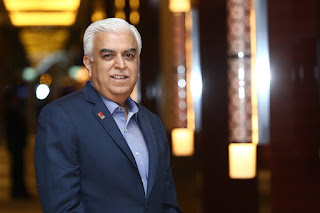SOCIAL MEDIA IMPACT ON SPENDING – BOON OR BANE NIRANJAN GIDWANI CONSULTANT DIRECTOR | BOARD MEMBER SSGMUAE | MEMBER UAE SUPERBRANDS COUNCIL | HBR ADVISORY COUNCIL | CHARTER MEMBER TIE DUBAI .
The powerful effects of social media on businesses and brands have been proven.
Over the past decade, the adoption of social media as an awareness, selling and customer relationship management tool has moved from large brands to even smaller and lesser-known brands as well as mom-and-pop stores.
With a large number using social media, it is very likely that the vast majority of our customers (or potential customers) are already online.
Nowadays, listing products in the dedicated “Shop” tab gives our items exposure to a wide breadth of audiences that were previously inaccessible through brick-and-mortar locations. It is important to recognize the effect of social media on consumer buying choices when considering the power of recommendations. Most modern consumers carry their purchasing power in their pockets.
With a very large number making buying decisions based on a friend’s social media post, the era of virtual
word-of-mouth recommendations is in full effect. Hiring a popular influencer in our brand’s niche to put a spotlight on our product or service can make a difference if handled correctly. Just one positive review conducted by a recognizable influencer has the capability of causing an influx in popularity and, more importantly, sales.
The new generation feels a sense of community on social media platforms. When a product is associated with a community or subculture, it can have a stronger influence on spending habits within that group. Understanding these dynamics helps businesses and marketers tailor their strategies to effectively reach and engage the new generation on social media platforms like Facebook, Instagram, TikTok, ultimately influencing their spending behaviors.
However, social media platforms are also filled with innumerable number of advertisements and posts promoting products and services. Seeing enticing ads or peer recommendations can lead to impulsive spending, as individuals may feel pressured to make unplanned purchases.
Social media also tends to portray only the glamorous aspects of people's lives. This does lead to feelings of inadequacy and a desire to "keep up" with the spending habits of others, potentially leading to overspending and lifestyle inflation. Overspending and card debts are seriously on the rise. In the last 12 months, US adults spent 71 billion USD on impulse buying. And data suggests that 57 percent of these US impulse buyers regret making at least some purchases.
Some interesting numbers - In India, daily engagement on social media is very high at 3 hours 14 minutes a day. Indian social media users have skyrocketed to 467 million and a whopping 89 percent are active every single day. In the UAE, users spend an average 2 hours 55 mins a day on social media. The figure for Saudi Arabia is 3hrs 1 min.
For brands, social media plays a crucial role in shaping consumer buying behavior by influencing product discovery, offering social proof, facilitating personalized marketing, and more. To leverage these benefits, brands need to maintain an active presence on social media platforms, engage with their audience, and capitalize on influencer marketing opportunities.
For consumers, social media can have a significant impact on the way they manage their money. While it can potentially lead to negative financial behaviors if used irresponsibly or impulsively, it can also be a valuable tool for financial education and support when used mindfully. It's crucial for individuals to be aware of how social media influences their financial decisions and to exercise caution and critical thinking when exposed to financial transactions online.
And to add to all this, along comes AI.
Today, in the AI economy, haves and have-nots will be decided by those who have the appropriate knowledge and those who do not have it. Now, even more, we will have to acquire new knowledge on a continuous basis. In other words, in an AI economy, we as individuals can never step off the knowledge-acquisition treadmill. While there has been a hue and cry over AI technology taking jobs away from humans, it is interesting to note that not much is written or discussed about equipping individuals to survive this shift through the structured acquisition of new knowledge and skills.
Truly, the power to create hype has shifted from the hands of a few to the fingertips of many. For our human race, this power can be manipulated both ways - for the good as well as the not so good. Also good to keep in mind that a wrongly influenced customer could be our parent, spouse, sibling or child.
Data Information sources - Global Media Insights, Statista, Inc42, 1finance.





